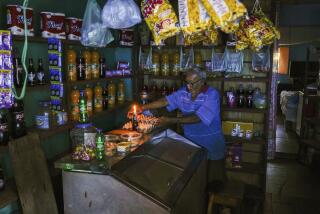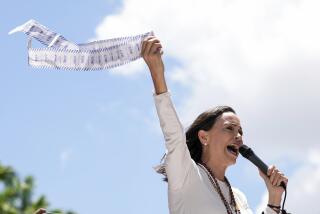Hardship overshadows Venezuela’s carnival season
LOS CORALES, Venezuela — “Together everything is possible.”
So read the pro-government banners on buses that ferried hundreds of children to a beach outside the Venezuelan capital on Friday, part of an official effort to celebrate the carnival season despite the country’s political and humanitarian crisis.
Elsewhere along the coastline near Caracas, workers assembled a drum set on a newly erected stage and colorful bunting fluttered in the breeze ahead of the scheduled festivities in Venezuela, which is buckling under shortages of food and medicine.
Many Venezuelans are not in a mood to party, and even the timing of the holiday is in dispute. The government of Nicolas Maduro declared that the carnival period started on Thursday, several days early. But the opposition-controlled parliament asked legislative workers to stay on the job until the weekend, saying this is hardly a time for celebration.
“Carnival without dreams,” read a sign at a recent protest against Venezuela’s dire economic situation.
Venezuela is gripped by a political crisis that pits Maduro against Juan Guaido, an opposition leader who is touring Latin America as part of a campaign to build international pressure on his rival to quit. The United States has imposed oil sanctions on Venezuela in an attempt to oust Maduro, and on Friday slapped sanctions on six high-ranking Venezuelan security officials for obstructing the delivery of humanitarian aid into the country.
Maduro had denounced the attempt to deliver aid from Colombia and Brazil last weekend as a scheme to overthrow him. Despite border clashes between Venezuelan security forces and protesters that killed several people, the municipal leader who organized buses to take children to the Camuri Chico beach near Caracas said Venezuela was peaceful.
“Venezuela is totally calm,” said Jose Vicente Rangel Avalos, the pro-Maduro mayor of the Caracas municipality of Sucre.
He said Venezuelans can resolve their differences through dialogue and the electoral process. The opposition rejects such assertions, saying Maduro was re-elected last year in a vote marred by irregularities and that his government has become increasingly authoritarian as conditions deteriorate in the oil-rich country.
At Camuri Chico beach, children splashed in the surf and played in the sand. A few hoisted kites. Many Venezuelans, however, are struggling to get basic necessities and don’t have the resources for leisure trips. A woman renting plastic chairs at the beach said the crowds were smaller than in past years, even if some people were determined to celebrate the carnival “despite everything that we’re going through.”
The woman spoke on condition of anonymity, saying Venezuela’s political problems made her nervous about being identified.
Venezuelan television tried to drum up a festive mood with footage of people dancing and a screen caption saying music is a way to reduce stress and anxiety. Another caption described the carnival season, which runs through Tuesday, as one of the year’s most “entertaining and colorful” times.
Guaido has announced that he plans to return home in coming days to lead protests against Maduro, an arrival that could coincide with the end of the carnival season. Maduro’s government said the opposition leader had left Venezuela illegally, stirring speculation about whether it will attempt to arrest or block him from entering the country.
___
Follow Christopher Torchia on Twitter at www.twitter.com/torchiachris
Copyright 2019 The Associated Press. All rights reserved. This material may not be published, broadcast, rewritten or redistributed.
More to Read
Sign up for Essential California
The most important California stories and recommendations in your inbox every morning.
You may occasionally receive promotional content from the Los Angeles Times.










